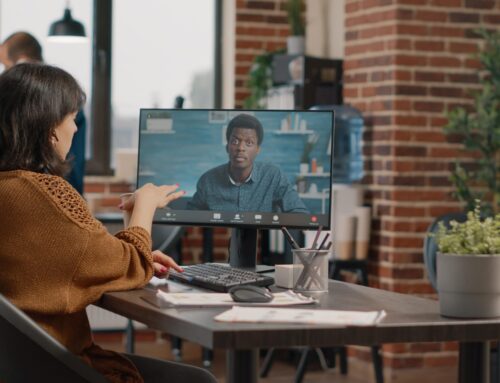Are you stuck on the right questions to ask your latest remote position candidates? We’ve got your back!
Conducting one-on-one interviews plays a pivotal role in gaining a deeper understanding of applicants’ crucial skills, experience, and alignment with your company culture. These interviews offer a unique opportunity to gauge a candidate’s character, problem-solving abilities, and compatibility and whether they would be a suitable addition to your team.
The interview process, particularly with remote hires, poses challenges for many hiring managers. Finding a new candidate, especially through global marketing recruitment agencies- can be a bit nerving since you’re stepping out of regional boundaries and communicating with individuals from a different cultural background. But, here’s the good news! At Bionic Talent we have dedicated ourselves to helping our clients ease through every step of their hiring process.
What Is a One-on-One Interview?
A one-on-one interview involves an individual meeting between the interviewer (typically a hiring manager, HR professional, or direct supervisor) and a candidate. This meeting provides a deeper, more personal understanding of the candidate beyond what a resume or cover letter reveals. We provide you with candidates harboring the best skills along with specific experience in your required niche. In this interview, the goal is to judge the candidates as a cultural fit for your team.
The private and less intimidating nature of one-on-one interviews fosters a more open and honest exchange between the interviewer and the candidate. It establishes a connection, creating an environment conducive to focused and meaningful discussions.
Here are some of the pros and cons of conducting casual one-on-one interviews;
Pros
Personalized Interaction
The one-on-one format allows for a tailored conversation, facilitating the exploration of a candidate’s background details and interpersonal skills.
Focused Discussion
With no additional interviewers, conversations remain centered on core competencies and job-relevant experiences.
Confidentiality
Sensitive topics like salary expectations or career goals can be discussed comfortably.
Cons
Risk of Bias
The involvement of a single interviewer may introduce personal bias, impacting the objectivity of the hire.
Time-Consuming
Through one-on-one interviews with multiple candidates can be time-consuming and challenging to schedule.
Limited Perspectives
Relying on one person’s perspective increases the risk of overlooking nuances crucial for assessing a candidate’s suitability. However, in most cases; our clients are the ones interviewing the interviews and as team leaders, this issue does not surface commonly.
Your Step-to-Step Guide on How to Conduct One-on-One Interviews
Now let’s dive into ensuring you know just how to nail the one-on-one interview process. Consider this step-by-step guide as your trusty roadmap for making the most out of your time with candidates, and making a sound judgment call.
Schedule and Prepare:
For starters, preparation is the key. Take some time before the interview to create a basic outline of how you will conduct the interview. Have your list of questions ready, tailored to the role. And remember not to rush into it– allocate enough time for a smooth conversation. Also, give the candidate a heads-up with an agenda so they can gear up too.
Create a Welcoming Environment:
The atmosphere matters a lot. Kick off the interview with a friendly icebreaker, and choose a background without distractions. Ensure everyone’s got a stable connection. Allow the candidate the space to think and answer questions.
Ask Relevant Questions:
Get creative with your questions. Mix it up with situational, behavioral, and skill-based ones. Steer clear of the yes-or-no zone; you want those detailed, real-life examples. And make sure you’re not just drilling their resume – dig into how they think, solve problems, and collaborate.
Ask them scenario-based questions on how they handle communication or a certain interaction while considering your team’s approach to work.
Talk About the Company and Role:
It’s a two-way street? You’re not just here to ask questions but to also provide suitable information to the candidate regarding your company. Discuss your company’s work style, and culture, and discuss the hierarchy and the role specifics. Give them the rundown of what their typical day would consist of and what tasks you’re expecting them to manage.
Finish strong, regardless of how you think the candidate did. Thank them for their time, show them the next steps in the application process, and be clear on when they can expect to hear from you.
Some Extra Tips to Make Your Interview Effective and Efficient:
- Don’t forget to ask behavioral questions! Behavioral questions serve as a powerful tool for deciphering a candidate’s past actions in specific situations, offering a prime indicator of their future conduct. Pose inquiries about their encounters with challenges, teamwork dynamics, and approaches to problem-solving.
- Engage in active listening. The art of active listening holds as much weight as posing the right questions. Provide the candidate with your undivided attention, steer clear of interruptions, and pick up on subtleties in their responses. This approach not only unveils what they are saying but also unravels the reasoning behind their words.
- Record the conversation. Taking notes throughout the interview is essential for capturing pivotal points, overall impressions, and any aspects requiring further consideration. This record becomes invaluable when later comparing candidates and attempting to recall specific details about their responses and demeanor.
our interviews shape not just your team but also your company’s long-term success. Are you ready to start the remote hiring process to upscale your company further? Don’t hesitate to connect with us- Bionic Talent – one of the best digital marketing recruitment agencies providing you access to global talent at 80% less cost.




